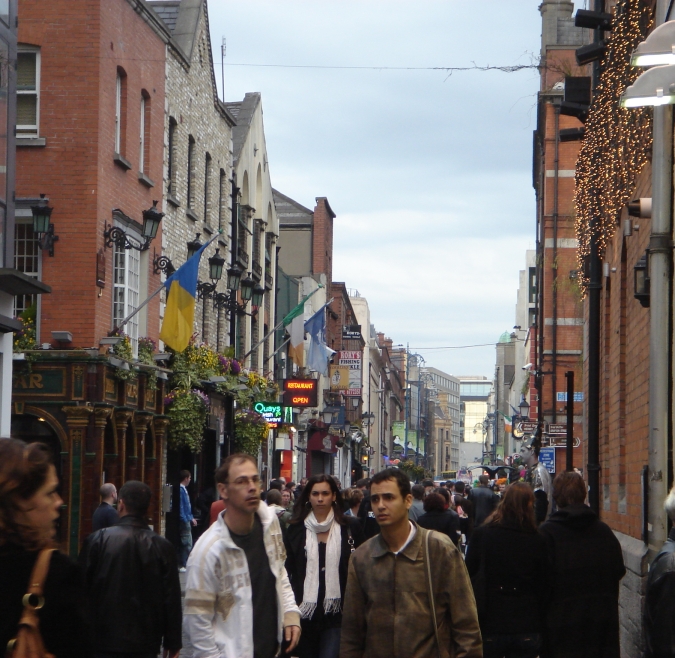University College Dublin (Ireland)
The Program
A distinctly Irish university, with global impact. A friendly city, with exciting life.
University College Dublin (UCD) was established in 1854 and among its more famous alumni is the writer James Joyce. The university consists of five colleges: Agriculture/Food Science/ Veterinary Medicine; Arts & Celtic Studies; Business & Law; Engineering & Architecture; Health Sciences; Human Sciences; and Physical/Life Science. UCD’s main Belfield campus is located 2.5 miles south of the city center, to which it is connected by a regular bus service.
Program Locations

Ireland
Dublin
The city of Dublin, on Ireland’s east coast, dates back to the time of the Vikings and beyond. For much of the last 1,000 years, it’s been Ireland’s cultural and political capital. Evidence of the city’s history, and its part in Ireland’s long struggle for independence, can be found all over the city. The Book of Kells, an illuminated, eighth-century manuscript displayed in Trinity College, is probably Ireland’s greatest cultural treasure. The nearby National Gallery, on Merrion Square, has works by Jack B. Yeats, brother of the poet, among others. As you walk the streets of Dublin, in the footsteps of Leopold Bloom and Stephen Dedalus, you’ll see statues of Joyce, Swift, and Beckett. You’ll also hear music emanating from dozens of pubs, especially in the Temple Bar neighborhood on the south bank of the Liffey.
Academics
In order to have an idea of what classes are available, you should visit the University College Dublin website. From this link, you can then access the pages for the Schools you are interested in. Once on the Schools' website you can then choose an academic program (major). To find individual courses you should go to the Module section and click on the different stage links. This will then take you to a list of courses.
When looking for courses, be sure that you are looking at courses for undergraduate students only and that you are looking at classes in the correct term of study. In addition to courses within their main college of study, students may choose up to two courses outside of their main college of study. For a listing of UCD Colleges and the schools that fall within each college, please visit this page.
You will need to be sure that you are registered as a full time student according to University College Dublin and Rutgers University. That means you will need to take the equivalent of at least 12 Rutgers credits each semester. The credit translation system between UCD and Rutgers University is 2:1, meaning a 10 credit course at UCD would come back as a 5-credit course on your Rutgers University transcript and a 5 credit UCD course would be worth 3 Rutgers credits. A normal class load at UCD is 6 courses, however Rutgers students may take less with prior approval. It is not possible to take classes as not-for-credit or pass/fail.
For information about Study Abroad credit transfer, registration, and transcripts please visit the Academics section of our website.
Housing and Meals
The Belgrove & Merville Residence Halls (*standard options), are located on the Belfield campus, typically features 4 to 5 single bedrooms, a study area, and two shared bathrooms. Each apartment includes a shared kitchen, and comfortable living space. At UCD, students experience safe, secure, and high-quality housing which aims to provide a comfortable and supportive living environment, fostering community and easing the transition to university life. There is an on-site laundry facility. Wifi is available throughout the entire UCD campus.
Located within walking distance to all campus amenities: restaurants; UCD library; UCD Sport and Fitness; UCD Student Health Centre; and a 10 minute walk to the campus bus terminus.
*For students interested in non-standard options, please note this is an additional cost (due to UCD-directly).
Meals
Make use of your kitchen, or purchase food at the many on-campus restaurants and cafes!
Financial Information
Program Costs
| NJ Resident | non-NJ Resident | |
|---|---|---|
| Program Cost | $19,500 | $23,700 |
Program Cost includes:
• Tuition
• **Housing (*standard option)
• Administrative Fees
• Emergency Medical Access Abroad
**Should you request housing other than Belgrove or Merville, you will be responsible for the pricing difference. This pricing difference will be billed to students directly by UCD.
Out-of-Pocket Costs
| Housing Deposit | $810 |
| Meals | $2,385 |
| Airfare | $900 |
| Local Transportation | $480 |
| Residence Permit (Estimate is for US Citizens) | $300 |
| Books and Classroom Materials | $250 |
| Personal Expenses | $1,000 |
| Total | $6,125.00 |
Out-of-Pocket Cost includes:
The above costs are estimations and represent the known out-of-pocket costs students encounter during their time abroad.
Some of these expenses will be paid for prior to going abroad, such as an airline ticket, while some of these expenses, such as meals and local transportation, will be paid in-country as part of your daily expenses. As you plan, you will need to budget these costs and spend wisely throughout your time abroad.
Program Costs
| NJ Resident | non-NJ Resident | |
|---|---|---|
| Program Cost | $19,500 | $23,700 |
Program Cost includes:
• Tuition
• **Housing (*standard option)
• Administrative Fees
• Emergency Medical Access Abroad
**Should you request housing other than Belgrove or Merville, you will be responsible for the pricing difference. This pricing difference will be billed to students directly by UCD.
Out-of-Pocket Costs
| Housing Deposit | $810 |
| Meals | $2,385 |
| Airfare | $900 |
| Local Transportation | $480 |
| Residence Permit (Estimate is for US Citizens) | $300 |
| Books and Classroom Materials | $250 |
| Personal Expenses | $1,000 |
| Total | $6,125.00 |
Out-of-Pocket Cost includes:
The above costs are estimations and represent the known out-of-pocket costs students encounter during their time abroad.
Some of these expenses will be paid for prior to going abroad, such as an airline ticket, while some of these expenses, such as meals and local transportation, will be paid in-country as part of your daily expenses. As you plan, you will need to budget these costs and spend wisely throughout your time abroad.


